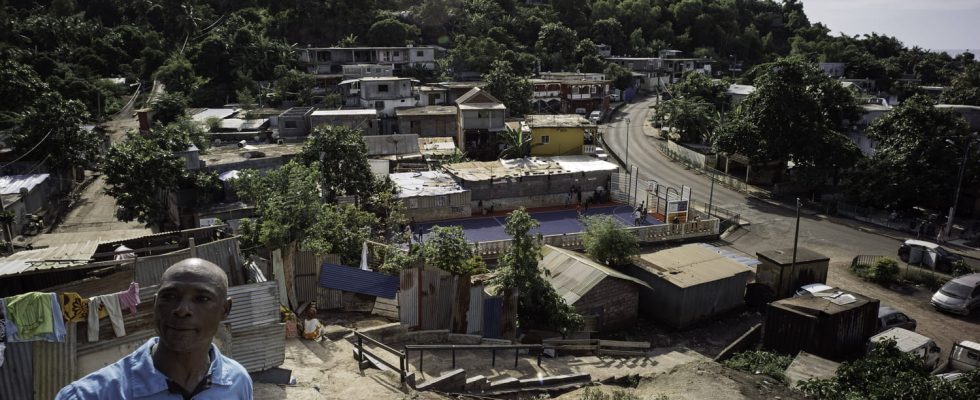MAYOTTE. Operation Wuambushu is due to start soon in Mayotte. Objective ? Fight against illegal immigration and crime by expelling people in an irregular situation and destroying slums. The policy is not unanimous.
The presence of reinforced law enforcement and fleeing immigrant residents. In Mayotte, the first effects of Operation Wuambushu have been felt since the weekend of April 22 and 23, 2023, when the launch of the project supposed to fight against illegal immigration and crime in the 101st French department is imminent. The two phenomena are closely linked according to the executive. “We find that the archipelago still experiences 16% more homicides in 2022 and 30% increase in violent robberies. […] It is not a delinquency as we know it in mainland France. It is made up of many young people who have dropped out of school, many in an irregular situation” unrolled the Minister of the Interior, Gérald Darmanin in the columns of the FigaroApril 20.
With the Wuambushu operation, 1,800 police and gendarmes are deployed, hundreds of whom arrive as reinforcements from mainland France. These police forces are already increasing identity checks to identify illegal immigrants but are also responsible for searching for and seizing weapons.
What is Operation Wuambushu in Mayotte?
The Wuambushu operation to be carried out in Mayotte aims to massively deport illegal immigrants with the quantified ambition of carrying out 300 deportations per day against the usual 70 according to information from the World. And these evictions must be accompanied by the destruction of 1,000 slums “by court order” to deter the return of strange people from illegal immigration, added Gérald Darmanin at the microphone of franceinfo April 21. While Mayotte is home to “the largest slum in Europe” according to local MP Estelle Youssouffa and is one of the poorest departments in France, the inhabitants of the slums doomed to be razed are not only immigrants. However, the government has promised to rehouse the Mahorais “in real accommodation”.
When does Operation Wuambushu begin in Mayotte?
No date has been set precisely by the government to record the establishment of the anti-immigration operation in Mayotte, at least not publicly. The Minister of the Interior was content to evoke an intervention on the “long course” while public order operations take place “every day” in Mayotte. In fact, the Wuambushu operation seems to have started during the weekend of April 22 and 23 with a significant increase in checks carried out by the police and gendarmes mobilized on the spot. The official launch of the operation is expected on Tuesday 25 or Wednesday 26 April with the first destruction of slums scheduled for Wednesday, according to franceinfo. Once launched, the operation could last several days or even several weeks.
An “anti-poor” and anti-immigration operation decried
Operation Wuambushu wanted and set up at the State is far from unanimous in Mayotte. Many organizations are rising up and calling on the government to abandon this project. Human rights associations were the first to criticize the operation, in particular Unicef and the Human Rights League: the first denounced a policy that could flout the rights of foreign children, while the second describes “an operation which violates the fundamental rights of those expelled and which is contrary to France’s international commitments in terms of respect for human rights”. These concerns are shared by the Defender of Rights, Claire Hédon, who assured to monitor the progress of this operation in particular by the presence of four delegates on the spot.
Respect for the right to housing is also called into question by the Wuambushu operation according to the Right to Housing association. The organization denounces this project which risks “breaking up families” and throwing the evicted people “into great misery”. The association considers the operation as an “anti-poor” policy which “confirms a new regression in the housing policies of the working classes: insalubrity is no longer reduced by relocating the inhabitants of informal neighborhoods, but by stigmatizing them for better justify their expulsion”.
In addition to the criticisms relating to the respect of human rights, there are also fears concerning the social consequences that are expressed. The president of the National Consultative Commission on Human Rights, Jean-Marie Burguburu fears in particular “a worsening of fractures and social tensions in an already very fragile context”.
What is the situation in Mayotte?
Mayotte is experiencing a particular situation where poverty and delinquency are reaching record levels in France. With the arrival of thousands of migrants, mainly from the Comoros, but also from Madagascar and a few African countries, the island has been in the grip of a migration crisis since 2011. INSEE estimates that half of the population of Mayotte n is not of French nationality but also that a third of foreigners were born in Mayotte.
In a context of great poverty faced by people of immigrant origin but also part of the Mayotte population – 77% of the population lives below the poverty line and the unemployment rate reaches 30%, according to MP Estelle Youssouffa asked about RTL – this cohabitation is not always peaceful. Some Mahorais support the expulsion of irregular immigrants who are often the majority in the slums, such as a nursery nurse who told theAFP “We are forced to lock ourselves in all the time. We cannot walk around with valuables. If we take the car out of the yard, we never know in what state we will bring it back”. But more than appeasing, Operation Wuambushu could rekindle tensions. Some of the illegal inhabitants of the island have fled the slums to escape eviction and these say they are ready to welcome the police with “Molotov cocktails” and promise revenge and violence after the destruction of the slum according to theAFP : a response to “the civil war of the Mahorais against us”.
